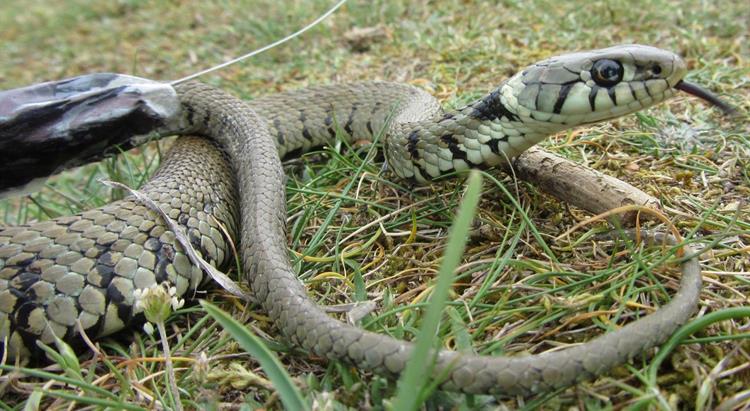26 February 2018

A new study on Jersey’s grass snakes has found that their numbers are higher than first thought, but they’re still at high risk of extinction.
The study, led by scientist Dr Rob Ward from the School of Anthropology and Conservation (DICE) at the University of Kent, working with Jersey’s Department of the Environment, gives some hope for the future of this protected species. His research, published in Scientific Reports, reveals that grass snakes are living at a number of nature reserves in the west and southwest of Jersey.
However, Dr Ward’s research has also found that grass snake numbers are low and that the creatures are extremely difficult to find, making it challenging to monitor changes in the population or estimate numbers. And, since many snakes aren’t recorded, they could be at risk if development starts on a new site.
Rarely seen
The grass snake is Jersey’s only snake and is completely harmless. It is rarely seen in Jersey. Reasons for its decline aren’t clear but may be linked to changes in the amount and quality of its habitat – like many species.
The study is the first to give an indication of the status of Jersey’s secretive grass snake population. It comes after Dr Ward spent four years conducting research on the snakes. During the two-year period spent searching for them, he walked over 613 km of survey routes and found 43 different individuals.
Research ecologist for the States of Jersey, Nina Cornish said “Grass snakes are an important part of our wildlife and one of our most endangered local animals. Habitat loss is one of their biggest threats. To maintain their survival in years to come the snakes need to be able to move between different areas to find food, hibernate and breed. If they are only in small populations in different locations, they are at risk of going extinct at each site and eventually, throughout Jersey.”
Look out for toads
The Department of the Environment will continue to work with other States departments, landowners and land managers to make sure they have the right corridors and habitat to survive.
Spring is an important time of year for reptiles and amphibians. Amphibians are heading to ponds to breed, and reptiles emerge in late spring as temperatures increase. Please look out for and avoid toads on wet roads at night, especially near the Five Mile Road.
Please report any sightings of reptiles, amphibians and other wildlife in Jersey to the Jersey Biodiversity Centre http://jerseybiodiversitycentre.org.je/ or +44 (0) 1534 633393. The records will help in future studies of Jersey’s wildlife.